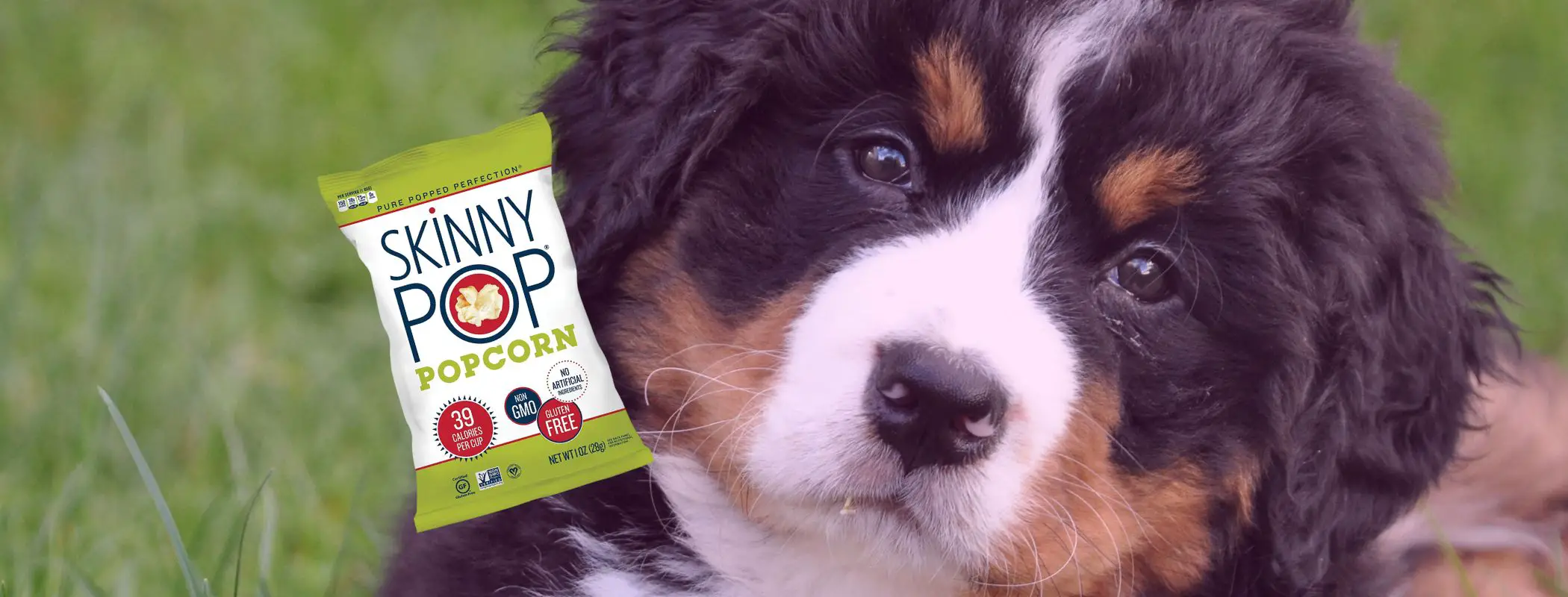Skinny Pop Popcorn may be a healthy choice for us, but it’s not a healthy snack that you should share with your dog.
Skinny Pop loves to add ingredients, such as salt, to their popcorn that aren’t considered nutritious for dogs. This is why you shouldn’t give it to your pet.
Let’s find out more about the Skinny Pop Popcorn brand, how it could affect your dog if it does eat it, and what alternative popcorn options there are for your hound.
Can Dogs Eat Skinny Pop Popcorn?
You probably came here thinking can dogs eat Skinny Pop popcorn?
The simple answer is no, they can’t.
Skinny Pop popcorn is commercially pre-packaged. It’s not recommended that dogs eat commercially pre-packaged popcorn as it often contains ingredients that dogs can’t eat or shouldn’t eat a lot of.
READ NEXT: Can dogs have salty popcorn?
Why Can’t Dogs Eat Skinny Pop Popcorn?
There are lots of reasons why dogs can’t eat Skinny Pop Popcorn, including:
- It contains salt – too much salt is bad for a dog.
- It contains unknown ingredients – for example, Skinny Pop’s White Cheddar Popcorn contains a natural non-dairy cheddar flavor. It’s not clear what this ingredient is, and there’s a possibility that it could be unsafe for dogs.
- It’s got a high-fat content – 4 cups of Skinny Pop Original Popcorn contains 10 g of fat. The majority of the fat comes from the oil that is used to make it. A dog’s diet should consist of less than 25% fat calories per day.
- It’s designed for humans not dogs – most dog food goes through rigorous testing before it is deemed safe and made available for sale. As Skinny Pop Popcorn is made for humans, dog-friendly tests have not been carried out.
Is Skinny Pop Popcorn Bad for Dogs?
Of all the commercially-packaged brands of popcorn that are available, Skinny Pop Popcorn is not the worst for dogs.
The company says that “We pride ourselves on providing you with a great tasting snack that’s free of all those things {artificial ingredients, flavors or preservatives}, including GMOs, MSG, dairy, peanuts, soy, tree nuts and gluten”.
Saying that, we still don’t suggest offering Skinny Pop Popcorn to your pooch. Its salt and fat content are particularly concerning. We believe that there are much healthier ways to offer popcorn to a dog, which we’ll share with you later in this article.
Will Skinny Pop Popcorn Make a Dog Sick?
There is a possibility that Skinny Pop Popcorn will make your dog sick. This is most likely to happen if your dog eats a lot of it.
The illnesses which are most likely to occur are:
- Pancreatitis
- Salt toxicosis
- Gastrointestinal upset
Dogs often get pancreatitis. Most cases are acute, but chronic pancreatitis can occur too. Eating high-fat food is one of the leading causes of pancreatitis in canines.
An 18 g bag of Skinny Pop Original Popcorn contains 6 g of fat which is 10% of the recommended daily amount for adults. If a dog eats a large amount of this popcorn, it could develop pancreatitis.
Signs of pancreatitis to look out for include:
- Poor appetite
- Vomiting
- Diarrhea
- Weight loss
- Stomach pain
Salt toxicosis is another health concern that could arise if a dog eats Skinny Pop Popcorn. Toxicosis can happen when a dog eats too much salt. Consuming 2 to 3 g of sodium per kilogram of body weight can cause some dogs to develop toxicosis.
One serving of Skinny Pop Original Popcorn contains 45 mg of sodium. And there’s more in some other flavors, including Sea Salt (50 mg) and Sweet & Salty Kettle Corn (110 mg).
A dog that’s eaten Skinny Pop Popcorn and is suffering from salt toxicosis will typically have the following symptoms:
- Vomiting
- Poor appetite
- Diarrhea
- Fatigue
- Excessive thirst
- Poor coordination
- Tremors or movements that resemble seizures
The final health issue to worry about when a dog gobbles up Skinny Pop Popcorn is gastrointestinal upset. Vomiting, cramps, and diarrhea are common. Often, these can be treated at home. But if they persist, you should speak to your dog’s vet.
What Flavors of Skinny Pop Popcorn Should Dogs Not Eat?
Dogs shouldn’t eat any flavors of Skinny Pop Popcorn. Skinny Pop currently makes the following flavors of popcorn:
- Original
- Sea Salt & Pepper
- White Cheddar
- Butter
- Aged White Cheddar
- Twist of Lime
- Sweet & Salty Kettle Corn
All of these flavors contain salt, which is bad for dogs in large quantities.
The flavors which may be particularly problematic if eaten by a dog are Twist of Lime and Sweet & Salty Kettle Corn. Limes contain a lot of citric acid which may cause gastrointestinal issues for dogs.
Meanwhile, sugar is unhealthy and contributes to diabetes and obesity in dogs. For these reasons, we wouldn’t suggest letting your dog near a bag of Skinny Pop’s Sweet & Salty Kettle Corn, no matter how delicious it is!
What to do if a Dog Eats Skinny Pop Popcorn
If you leave your bag of Skinny Pop Popcorn on the sofa while you use the bathroom and discover it has devoured the bag in your absence, you might panic.
The best thing you can do is stay calm and assess the situation. Think about how much Skinny Pop Popcorn your dog has eaten and which flavor it has consumed. Thankfully, there aren’t any ingredients in any flavors of Skinny Pop popcorn that are poisonous for dogs, so there’s no need to rush your pet straight to the vet.
Instead, keep a close eye on your furry friend to see if any untoward symptoms appear. If they do and you get concerned that it has more than a minor stomach upset, contact your vet for expert advice.
Which Brands of Popcorn Are Safe for Dogs?
None. Dogs shouldn’t ever be given branded bags of popcorn designed for humans to eat. This doesn’t mean that dogs have to miss out on popcorn during your next movie night, though.
Plain, air-popped popcorn can be a nutritious treat for a dog. Just make sure you make it yourself and only offer a few pieces of it to your pooch.
Skinny Pop popcorn is one of the most popular brands of popcorn. It’s typically seen as a healthy treat. But always keep it for yourself as it’s not a type of popcorn that dogs should eat.
Sources
https://www.heb.com/product-detail/skinnypop-white-cheddar-popcorn/1848100
https://www.pdsa.org.uk/pet-help-and-advice/pet-health-hub/conditions/pancreatitis-in-dogs






